
We spend so much time on our quilt tops that our quilt backings are often an afterthought. Knowing what size to make your backing and how to properly piece it can make your quilt easier to quilt and also make you happier with the finished product.
What Is the Best Fabric for Backings?
There are no rules. Some quilters prefer to use fabric that matches the quilt top. Some quilters choose fabric from the sale rack of their local quilt shop (I’m raising my hand here). Some quilters use whatever they have in their stash. I’ve seen lovely pastel quilts with nonmatching neon backings and they were delightful, so matching isn’t necessary. When I don’t want the quilting to show on the backing, I choose a densely printed backing fabric. When I really want the quilting to show on the back of the quilt, which isn’t often, I choose a plain backing.
What Size Should the Backing Be?
I recommend that your backing be approximately 4 inches larger than your quilt top all the way around, so take the finished dimensions of your quilt top and add 8 inches to each dimension. The extra fabric outside the quilt-top edges gives you something to hold while you are quilting the edges of the quilt. If you have minimal (less than an inch) extra backing, you’ll have to move the entire quilt with just your fingertips. Moving the quilt with your whole hand on those extra 4 inches of quilt backing is less tiring for your hands and arms, and your quilting will likely look smoother too!
This story is from the Winter 2020 edition of Quilter's World.
Start your 7-day Magzter GOLD free trial to access thousands of curated premium stories, and 9,000+ magazines and newspapers.
Already a subscriber ? Sign In
This story is from the Winter 2020 edition of Quilter's World.
Start your 7-day Magzter GOLD free trial to access thousands of curated premium stories, and 9,000+ magazines and newspapers.
Already a subscriber? Sign In
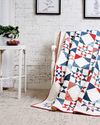
SWEET LAND of Liberty
Basic blocks in red, white and blue that don't have a specific fabric placement make this scrappy patriotic quilt an easy summer project.
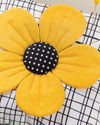
Spring Bloom Pincushion
A pincushion can be just as decorative as it is useful. This generous-size pincushion features big bright petals and dimensional leaves that can be used to keep binding clips handy.
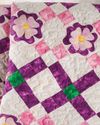
Petal Power
This fun throw-size quilt mixes raw-edge–fusible appliqué flowers with simple Nine-Patch blocks. The color placement within the nine-patches creates a secondary trellis pattern.
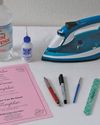
Turned-Edge Appliqué
You can master beautiful hand appliqué with these easy steps.
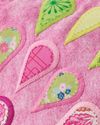
Petal Pillow
Pretty appliquéd felt petals spill across this simple springtime pillow. A quarter-circle arrangement of pink buttons serves as the flower’s center and adds extra texture.
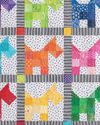
Sassy Scotties Baby Quilt
Grab your scrap bag and have fun combining colorful prints for this baby quilt. A traditional Scottie block looks new and updated with bright rainbow colors.
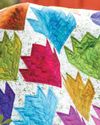
Flowers for Larry
Big beautiful blooms in a rainbow of colors are surrounded by a bright floral border—a lovely garden that will never need weeding!
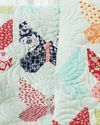
Butterfly Collection
Colorful butterflies gracefully fly across this throw-size quilt. Did you know they can fly at speeds of up to 30 mph?
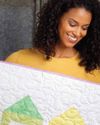
Candy Neighborhood
Soft cotton-candy colors are served in Candy Neighborhood, inspiring a rainbow arrangement of trees and houses in this friendly town.
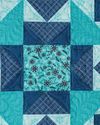
Blue Belle
Choose your favorite fabrics and make this sweet wall quilt in an afternoon. It looks lovely in a monochromatic color scheme, but try it with solids, 1930s, batiks—anything works.